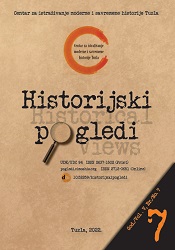Zašto je bugarska teza o makedonskom identitetu pogrešna?
Why is the Bulgarian Thesis on Macedonian Identity Wrong?
Author(s): Salim Kadri KerimiSubject(s): Ethnohistory, South Slavic Languages, Identity of Collectives
Published by: Centar za istraživanje moderne i savremene historije Tuzla
Keywords: Macedonians; Bulgarian; Kominterna; Josiph Broz Tita; Josiph Visarionovic Stalin; Janko Peev; Victor Berard; Andre Mazon; Eqrem bey Vlora;
Summary/Abstract: Bulgarian theses that: Macedonians have Bulgarian roots, while the Macedonian language is a dialect of the Bulgarian language, and, that the Macedonian identity is a „product" of the Comintern, ie., of Josiph Broz Tita and Josiph Visarionovic Stalin, are wrong. More historical facts show that the Macedonian and Bulgarian nations come from different origin, whose settled in the territory of today's Balkan Peninsula in different periods and from two different parts of the world. „ Macedonians are the South Slavic people, ... descendants of the old Slavic tribes, who inhabited the Balkan Peninsula in the 6th and 7th centuries ...", while the Bulgarians are the South Slavic people who inhabit the eastern part of the Balkans. Their origin is linked to Asia. Based on the data of ancient Chinese chronicles, it is considered that the language of the Proto-Bulgarians was part of the Altaic language community, i. e. its Turkish branch, which also included Huns, Avars, Hazars, Oguz, Pechenegs, Kumans and others ". As is already known, in the past members of today's Macedonian nation, „by force or kindness", were presented as an integral part not only of the Bulgarian, but also of the Serbian and Greek nations. In the 19th century, like any other nation, Macedonians fought for their national rights, but for some reasons, they managed to realize their national aspirations until August 2, 1944. Macedonian language is similar to other Slavic languages and especially to the Bulgarian and Serbian languages, which belong to the so-called Indo-European language group. The Macedonian language was officially codified in 1945 and, like other languages, enjoys the same status in all international institutions, including the UN. That Macedonian identity and language are different from Bulgarian identity and language in the past has been confirmed by various personalities and documents, including by: Ambassador of Bulgaria in Tirana, Albania – Janko Peev (in 1938); French writer, publicist and politician Victor Berar; French university professor - Slavist Andre Mazon; and Albanian politician, diplomat and publicist Ekrem Bey Vlora. The above mentioned and many other authors speak in a clear way about the existence of the Macedonian identity and language, which is different from the Bulgarian identity and language. Therefore, it can be concluded from the above that the Bulgarian theses about the alleged common origin of Macedonians with Bulgarians are scientifically incorrect, and their insistence Macedonian side to accept the alleged „historical truth", conditioning even the start of Northern Macedonia 's EU membership negotiations, is more than absurd. In my opinion, the approach of the EU members that allowed such behaviour of Bulgarian politicians and any other EU member states at the beginning of the third decade of the 21st century is even more absurd. In other words, instead of EU members being consistent in applying their European values, regarding respect for the sovereign right of every nation on its national affiliation and instead insisting on respecting and implementing by the Bulgarian side numerous decisions of European institutions, recognizing the existence and rights of Macedonian minorities in Bulgaria, they allow current Bulgarian politicians to deal with absurd things, characteristic of the l 9th century.
Journal: HISTORIJSKI POGLEDI
- Issue Year: V/2022
- Issue No: 7
- Page Range: 292-302
- Page Count: 11
- Language: Bosnian

